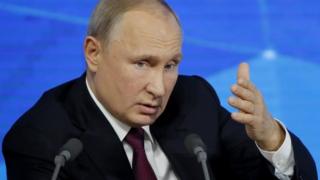
Image copyright
Reuters
President Vladimir Putin has denied claims of Russian interference
A report on alleged Russian interference in UK democracy will not be published until after the election.
It has gone through the standard security clearance process, but sources say No 10 is stalling on releasing it.
Ex-terrorism watchdog Lord Anderson said any further delay would “invite suspicion” of the government’s motives in the run-up to next month’s election.
Ministers said the report would be published “in due course” in line with procedures for “sensitive” information.
The report examines Russian activity including allegations of espionage, subversion and interference in elections.
The BBC’s Mark Urban said the delay would increase concerns the report would be “buried”.
The report, written by Parliament’s Intelligence and Security Committee, was finalised in March and referred to No 10 on 17 October.
However, approval for its publication has yet to be given and this now looks highly unlikely before Parliament is dissolved on Tuesday.
The chairman of the committee, Dominic Grieve, says there is no legitimate reason for delaying it and that voters have a right to see its conclusions before they go to the polls on 12 December.
“We continue to be very disappointed by the failure of the government to publish this report and to provide any explanation as to why it should not be published. Explanations currently advanced that the timing are too short are entirely disingenuous and grossly misleading,” he told the BBC.
The report includes evidence from UK intelligence services such as GCHQ, MI5 and MI6 concerning covert Russian attempts to influence the outcome of the 2016 EU referendum and 2017 general election.
Several MPs and peers believe No 10 is sitting on the report for political reasons ahead of the election.
Raising the issue in the Lords, Lord Anderson, the former reviewer of anti-terrorism legislation, said concerns over security could not be used as an excuse for non-publication as all the necessary redactions had taken place.
“This unjustified delay undermines the ISC, it invites suspicion of the government and its motives. Will the minister urge No 10 to think again?”
‘Public interest’
The former head of the Foreign Office, Lord Ricketts, said claims that the government needed time to respond was a red herring given that it had 60 days in which to do so under existing conventions.
He said there was a “clear public interest” for publication “in the national security implications of Russia’s adversarial conduct”.
The BBC understands that, if previous practice was followed, the report will have been vetted by the intelligence agencies before being referred to Downing Street.
People familiar with the committee’s workings say 10 days should have been adequate for it to be “cleared”.
Mr Grieve said the report was highly relevant given the scale of Russian interference in elections in other countries, notably the 2016 US Presidential election.
But Earl Howe said the established protocols had to be followed and there was no case for “accelerating” the report’s release.
“The length of time the government has had this report is not at all unusual,” he told the Lords. “The prime minister is entitled to take his view on what the report contains.”
But he added: “Having said all that, I do realize that the subject of this report is a matter of particular public interest. And I have no doubt that level Lords comments will not be lost on those in Number 10.”
Source link


